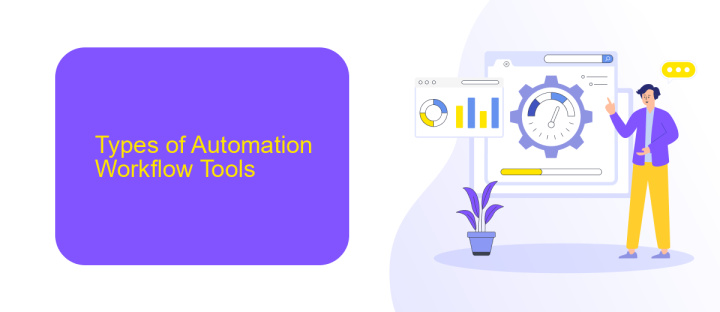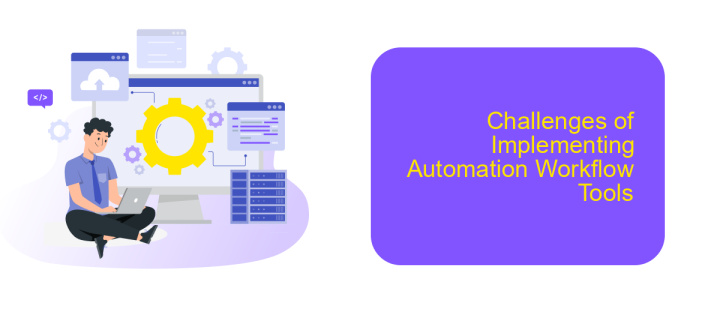Automation Workflow Tools
In today's fast-paced digital landscape, automation workflow tools have become indispensable for enhancing productivity and efficiency. These tools streamline repetitive tasks, reduce human error, and free up valuable time for more strategic activities. Whether you're managing a small business or a large enterprise, understanding and implementing the right automation solutions can significantly transform your operational dynamics and drive success.
Benefits of Automation Workflow Tools
Automation workflow tools have revolutionized the way businesses operate by streamlining processes and enhancing productivity. These tools offer a myriad of benefits that can significantly impact organizational efficiency and effectiveness.
- Increased Efficiency: Automation reduces manual tasks, allowing employees to focus on more strategic activities.
- Error Reduction: Automated workflows minimize human errors, ensuring higher accuracy in tasks.
- Cost Savings: By automating repetitive tasks, organizations can reduce labor costs and improve overall operational efficiency.
- Improved Collaboration: These tools facilitate better communication and coordination among team members.
- Scalability: Automation allows businesses to easily scale their operations without proportional increases in resources.
One notable tool for setting up integrations is ApiX-Drive, which enables seamless connections between various applications and services. By utilizing such tools, businesses can automate data transfer and synchronization, further enhancing their workflow efficiency. Overall, automation workflow tools are indispensable for modern businesses aiming to stay competitive and agile in a rapidly evolving marketplace.
Types of Automation Workflow Tools

Automation workflow tools come in various types, each designed to streamline specific tasks and processes. The first type includes task automation tools, which focus on automating repetitive tasks such as data entry, email responses, and scheduling. These tools are ideal for reducing manual workload and increasing productivity. Examples include Zapier and Microsoft Power Automate, which allow users to create automated workflows by connecting different applications and services.
Another significant type is integration automation tools, which facilitate seamless data transfer and communication between disparate systems. These tools are essential for businesses that rely on multiple software solutions and need to ensure data consistency across platforms. ApiX-Drive is a notable example, offering robust integration capabilities that enable businesses to set up automated workflows without requiring extensive technical knowledge. By using such tools, companies can enhance efficiency, reduce errors, and improve overall operational harmony.
Features of Automation Workflow Tools

Automation workflow tools are essential for optimizing business processes, reducing manual effort, and increasing efficiency. These tools offer a variety of features to streamline operations and ensure seamless workflow management.
- Task Automation: Automate repetitive tasks to save time and reduce human error.
- Integration Capabilities: Connect with various applications and services, such as ApiX-Drive, to enable smooth data transfer and synchronization.
- Real-Time Monitoring: Track workflows in real-time to quickly identify and resolve issues.
- Customizable Workflows: Design workflows that fit specific business needs with drag-and-drop interfaces.
- Reporting and Analytics: Generate detailed reports to analyze performance and make informed decisions.
These features make automation workflow tools indispensable for modern businesses. By leveraging tools like ApiX-Drive for integration, companies can further enhance their workflow automation, ensuring that data flows seamlessly between different systems and applications.
Challenges of Implementing Automation Workflow Tools

Implementing automation workflow tools can present a range of challenges, despite their potential to streamline operations and enhance productivity. One of the primary obstacles is the initial setup and integration with existing systems. Many organizations find it difficult to seamlessly integrate new tools with their legacy systems, leading to potential disruptions in workflows.
Another significant challenge is the learning curve associated with these tools. Employees may need extensive training to effectively use new automation software, which can temporarily reduce productivity. Additionally, resistance to change from staff can further complicate the adoption process.
- Integration with legacy systems
- Steep learning curve for employees
- Resistance to change from staff
- High initial costs
To mitigate these challenges, leveraging integration services like ApiX-Drive can be beneficial. ApiX-Drive simplifies the process of connecting various applications and automating workflows, reducing the complexity of setup and integration. By using such services, organizations can overcome many of the hurdles associated with implementing automation workflow tools, ensuring a smoother transition and better overall efficiency.
Future of Automation Workflow Tools
The future of automation workflow tools is set to be transformative, driven by advancements in artificial intelligence and machine learning. These technologies will enable automation tools to become more intuitive and capable of handling complex tasks with minimal human intervention. As businesses continue to seek efficiency and productivity, the integration of AI will allow for predictive analytics, real-time decision-making, and adaptive workflows that can respond dynamically to changing conditions.
Moreover, the rise of no-code and low-code platforms will democratize the use of automation tools, making them accessible to non-technical users. Services like ApiX-Drive will play a crucial role in this evolution by simplifying the process of integrating various applications and services. By providing a user-friendly interface for setting up integrations, ApiX-Drive allows businesses to streamline operations without the need for extensive coding knowledge. This trend towards user-friendly, intelligent automation solutions will redefine how organizations operate, leading to increased agility and innovation.
- Automate the work of an online store or landing
- Empower through integration
- Don't spend money on programmers and integrators
- Save time by automating routine tasks
FAQ
What is an automation workflow tool?
How can automation workflow tools benefit my business?
Can automation workflow tools integrate with other software?
Is it difficult to set up and use an automation workflow tool?
What types of tasks can be automated with workflow tools?
Do you want to achieve your goals in business, career and life faster and better? Do it with ApiX-Drive – a tool that will remove a significant part of the routine from workflows and free up additional time to achieve your goals. Test the capabilities of Apix-Drive for free – see for yourself the effectiveness of the tool.


